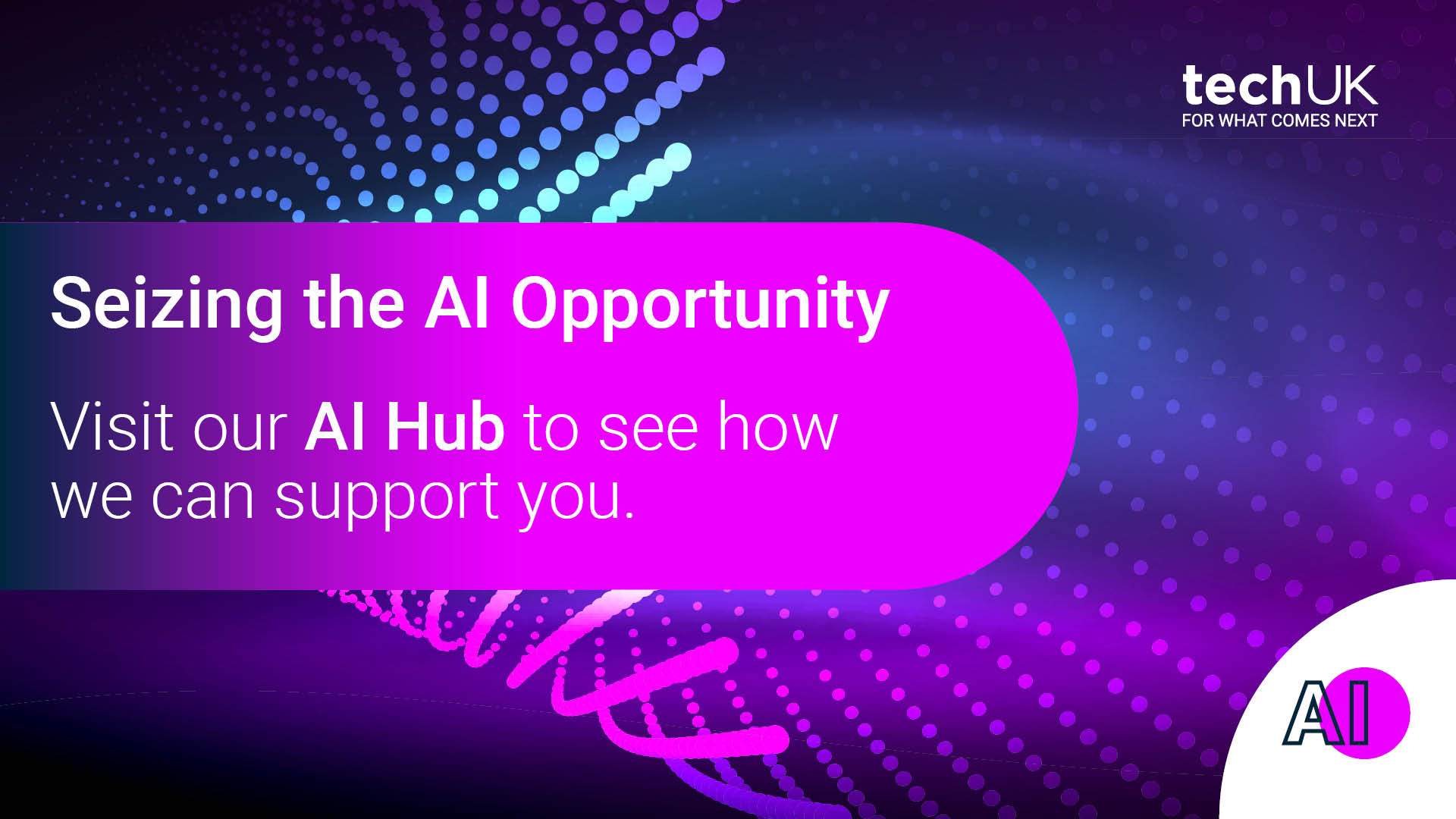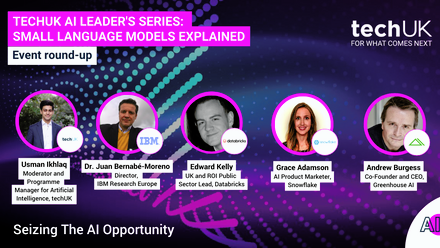Guest blog (SoftProdigy): AI and society - a case study on positive social change
Artificial intelligence (AI) has revolutionised various aspects of our lives, impacting sectors like healthcare, business, and daily interactions. AI's ability to analyse data, recognise patterns, and make independent decisions has reshaped the way we live and work. Key factors driving AI's rise include increased computing power, greater data availability, and advancements in machine learning.
In the business world, AI has streamlined processes, cut costs, and improved the quality of products and services through automation. AI is transforming how we use technology and interact with one another. And virtual assistants and chatbots, powered by natural language processing, have revolutionised information access and communication. According to a recent report published by techUK, the future of work will be AI-enabled. In the workplace, working with or alongside technology like AI will feel as normal as using email. In some organizations, it already is.
In healthcare, AI has brought breakthroughs in disease detection, drug discovery, and personalised treatment plans. Machine learning algorithms analyse medical images like X-rays, aiding in early detection and accurate diagnoses. But despite these advancements, ethical concerns about privacy, bias, and algorithmic accountability remain key when considering AI systems.
As AI continues to evolve, it raises philosophical questions about the nature of intelligence and human potential. The search for artificial general intelligence (AGI) challenges traditional boundaries and sparks discussions about its ethical, legal, and existential implications. While AGI's arrival is uncertain, proactive conversations around its development are already underway.
Understanding Artificial Intelligence
Artificial intelligence is like teaching machines to think and act like humans. It involves using computer programs and hardware to copy human-like abilities such as solving problems, making decisions, understanding language, learning, and recognising things. AI systems can do many things humans do, like learning from experience, adapting to new situations, and getting better over time.
There are specific areas in AI, like machine learning (computers learning from data), natural language processing (computers understanding human language), computer vision (computers understanding visual information), and robotics (creating machines that can do tasks on their own).
AI can be either broad (acting almost like humans in various tasks) or narrow (focused on specific jobs with limited abilities). While we've made progress in certain types of AI, we haven't created a super-smart AI that can do everything like a human.
AI has tons of uses in medicine, business, transportation, art, education, and more. It's like giving technology the power to do routine tasks, be more efficient, and explore new possibilities that regular computers couldn't handle.
Positive impact of Artificial Intelligence
The introduction of artificial intelligence technology has caused a ripple effect across various aspects of our culture, influencing professionals, lawyers, and technocrats alike. Professionals accustomed to modern technologies find themselves navigating a changing world, where AI's impact is increasingly pervasive.
Lawyers, in particular, are grappling with the regulatory implications of AI, recognising the need to adapt to the evolving technological market and its legal nuances. Technocrats, who heavily rely on modern technology for intricate decision-making in complex technical matters, are experiencing a transformation in their approach.
AI's integration into society is not just a momentary change but a shift with immediate, intermediate, and lasting cultural effects, reshaping how individuals in different fields engage with and respond to the influence of advanced technology.
Here are just some of the positive impacts of artificial intelligence:
AI-Based Surgical Procedures:
Artificial intelligence has significantly impacted surgical procedures, allowing individuals to opt for AI-assisted surgeries. In many modern hospitals, the da Vinci surgical system, a form of robotic technology, is now accessible. Skilled medical professionals operate this system to conduct surgical procedures with a focus on minimally invasive techniques.
The integration of AI in surgeries enhances precision and accuracy beyond human capabilities. These advanced technologies contribute to less intrusive procedures, leading to reduced pain, minimal blood loss, and decreased stress for patients undergoing surgery. While AI plays a crucial role, it is essential to emphasise that skilled medical professionals continue to operate and oversee these AI-assisted surgical processes, ensuring the safety and well-being of patients throughout the procedure.
Socially Therapeutic Robots:
Introducing socially therapeutic robots represents a transformative approach to enhancing the well-being of those requiring care. Similar to the positive impact of having pets, these cybernetic companions aim to enrich the lives of the elderly by addressing various aspects of their health and daily experiences. Beyond mere assistance with housekeeping, these therapeutic robots serve as companions, contributing to lower blood pressure, alleviating feelings of anxiety and loneliness, and encouraging increased social interaction.
Tailored to the needs of older people and individuals with physical limitations, these socially assistive robot technologies offer a holistic solution to promote a higher quality of life. By combining technological innovation with compassionate support, these robots become valuable companions, providing not just practical assistance but also emotional support, ultimately contributing to the overall well-being of those they interact with.
Quick Diagnostics:
Artificial intelligence has the potential to revolutionise the diagnostic process by offering doctors a range of treatment options. Here's how it typically works: After conducting a physical examination, the digital results are input into a computer system. The computer, equipped with advanced algorithms, thoroughly analyses the data, automatically identifying potential deficiencies or illnesses the patient may be experiencing.
Furthermore, AI goes a step further by suggesting a variety of treatment plans based on its analysis. This transformative capability not only accelerates the diagnostic phase but also provides healthcare professionals with valuable insights into the most effective treatment options available. The integration of AI in healthcare indicates a new era of fast and accurate diagnostics, streamlining the decision-making process for medical practitioners and enhancing the overall quality of patient care.
Virtual Presence:
Virtual presence technology has paved the way for groundbreaking advancements in remote healthcare. Now, patients can receive diagnoses without leaving the comfort of their beds, thanks to physicians conducting remote checks using advanced robots as their virtual presence in the room. The interaction and movements of the medical staff through these robots closely simulate an in-person experience. This technological marvel not only ensures efficient communication but also facilitates thorough examinations.
The significance of this capability shines brightly in reaching and providing medical care to patients who are confined to their homes. The breakthrough in virtual presence has not only transformed the traditional healthcare model but has become a ray of hope for individuals with limited mobility, offering them access to timely and crucial medical services without needing physical travel.
Enhanced Radiological Advancements:
As we approach the turn of the millennium, significant strides are made in prenatal imaging, cardiac magnetic resonance imaging (MRI), and whole-body MRI. These technologies become widespread, revolutionising medical diagnostics. The quest for more advanced algorithms for diagnosing specific illnesses and interpreting scan results gains momentum. A pivotal breakthrough in this plan is the integration of artificial intelligence.
The development of AI has played a crucial role in achieving these milestones, offering sophisticated solutions that contribute to the refinement and precision of medical imaging techniques. The continuous exploration of improved algorithms, associated with the power of AI, signifies a transformative era in radiology, promising not only widespread accessibility to advanced imaging methods but also a deeper understanding of medical conditions through more accurate and efficient diagnostic tools.
AI in Education:
How many of you know that AI worked wonders for the education industry and will continue to do so? Well, AI has positively impacted education by introducing personalised learning experiences, adaptive assessments, and efficient administrative tasks. Personalised learning platforms leverage AI to tailor educational content to individual student needs, enhancing comprehension and engagement.
Adaptive assessments use AI algorithms to evaluate student performance, providing real-time feedback and adapting difficulty levels for optimal learning. Additionally, AI streamlines administrative tasks, enabling educators to focus more on teaching by automating marking, scheduling, and other routine responsibilities. These advancements contribute to a more effective, inclusive, and student-centric education system.
Final thoughts
The positive impact of artificial intelligence on society is undeniably profound, touching various aspects of our lives and shaping a future that was once only imaginable in science fiction. From advancements in healthcare, where AI aids in early detection and diagnosis, to the optimisation of business processes through automation, and even the transformation of education with personalised learning, AI has proven to be a catalyst for positive change.
The efficiency, accuracy, and innovative solutions brought forth by AI contribute to enhanced decision-making and problem-solving across diverse sectors. Moreover, AI's ability to augment human capabilities rather than replace them enables collaboration and opens doors to new opportunities. While ethical considerations and responsible AI development are crucial aspects, the overall trajectory of AI's positive impact on society signifies a promising era of technological advancement, improved quality of life, and increased accessibility to solutions that benefit humanity.
techUK - Seizing the AI Opportunity
The UK is a global leader in AI innovation, development and adoption. The economic growth and productivity gain that AI can unlock is vast, but to fully harness this transformative opportunity, immediate action is required. techUK and our members are committed to working with the Government to turn the AI Opportunities Action Plan into reality. Our aim is to ensure the UK seizes the opportunities presented by AI technology and continues to be a world leader in AI development.
techUK runs a full calendar of activities including events, reports, and insights to demonstrate some of the most significant AI opportunities for the UK. Our AI Hub is where you will find details of all upcoming activity. We also send a monthly AI newsletter which you can subscribe to here.
Upcoming AI events
Latest news and insights
Sign-up to get the latest updates and opportunities across Technology and Innovation & AI.
Contact the team
Learn more about our AI campaign:










